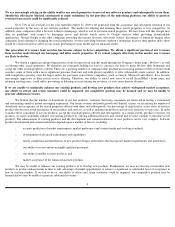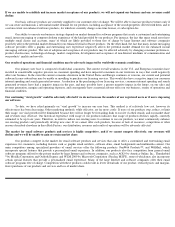Incredimail 2009 Annual Report Download - page 20
Download and view the complete annual report
Please find page 20 of the 2009 Incredimail annual report below. You can navigate through the pages in the report by either clicking on the pages listed below, or by using the keyword search tool below to find specific information within the annual report.
New laws and regulations applicable to e-
commerce, Internet advertising, privacy and data collection, and uncertainties regarding the
application or interpretation of existing laws and regulations, could harm our business.
Our business is conducted through the Internet and therefore, among other things, we are also subject to the laws and regulations that
apply to e-
commerce. These laws and regulations are becoming more prevalent in the United States, Israel and elsewhere and may impede the
growth of the Internet or other online services. These regulations and laws may cover taxation, user privacy, data protection, pricing, content,
copyrights, electronic contracts and other communications, Internet advertising, consumer protection, the provision of online payment services,
broadband residential Internet access, and the characteristics and quality of products and services.
Many areas of the law affecting the Internet remain largely unsettled, even in areas where there has been some legislative action. It is
difficult to determine whether and how existing laws, such as those governing intellectual property, privacy and data protection, libel, data
security and taxation, apply to the Internet and our business. New laws and regulations may seek to impose additional burdens on companies
conducting business over the Internet. We are unable to predict the nature of the limitations that may be imposed.
For example, legislation has been enacted to regulate the use of “cookie”
technology. Upon installation of our software, certain cookies
generated by us and our advertisers are placed on our customers’
computers. It has been argued that Internet protocol addresses and cookies are
intrinsically personally identifiable information that is subject to privacy standards. We cannot assure you that our current policies and
procedures would meet these restrictive standards.
In addition, technology is changing constantly and data security regulations and standards are in a state of flux. Changes in law or
regulations may require that we materially change the way we do business. For example, we may be required to implement physical,
administrative and technological security measures different from those we have now, such as different data access controls or encryption
technology. We may incur substantial expenses in implementing such security measures.
In addition, although current decisions of the U.S. Supreme Court restrict the imposition of obligations to collect state and local sales
and use taxes with respect to sales made over the Internet, the U.S. Congress and a number of states have been considering or have adopted
various initiatives that could limit or supersede these decisions. If any of these initiatives result in a reversal of the Court’
s current position, we
could be required to collect sales and use taxes on our U.S. sales. The imposition by state and local governments of various taxes upon Internet
commerce could create administrative burdens for us and could decrease our future sales.
The EU has already enacted legislation regarding Value Added Tax imposed on certain software sold by companies outside the EU to
consumers in the EU over the Internet. This legislation could be interpreted to include other parts of the Company’
s business not yet accrued for
by the Company, causing additional significant tax exposure, or alternatively, reduce the competitiveness of the Company’
s pricing of its
products.
The cost of compliance with taxation, consumer and privacy related regulations could be material and we may not be able to comply
with the applicable regulations in a timely or cost-
effective manner. In response to evolving legal requirements, we may be compelled to change
our business model and practices, which could reduce our sales, and we may not be able to replace the revenues lost as a consequence of the
change. These changes could also require us to incur significant expenses, subject us to liability and require increased time and attention of our
management. See “Item 4.B Business Overview — Government Regulation”
for additional discussion of applicable regulations affecting our
Company.
Risks Related to Our Operations in Israel
Political, economic and military instability in the Middle East may impede our ability to operate and harm our financial results.
Our principal executive offices are located in Israel. Accordingly, political, economic and military conditions in the Middle East may
affect our business directly. Since the establishment of the State of Israel in 1948, a number of armed conflicts have occurred between Israel and
its Arab neighbors. During the winter of 2008, Israel was engaged in an armed conflict with Hamas, a militia group and political party operating
in the Gaza Strip, and during the summer of 2006, Israel was engaged in an armed conflict with Hezbollah, a Lebanese Islamist Shiite militia
group and political party. These conflicts involved missile strikes against civilian targets in various parts of Israel, and negatively affected
business conditions in Israel. Any hostilities involving Israel or the interruption or curtailment of trade between Israel and its present trading
partners could affect adversely our operations. Although Israel has entered into various agreements with the Palestinian Authority, Israel has
been and is subject to civil unrest and Palestinian terrorist activity, with varying levels of severity, since October 2000. Tension among the
different Palestinian factions may create additional unrest and uncertainty. Ongoing and revived hostilities and the attempts to resolve the
conflict between Israel and its Arab neighbors often results in political instability that affects the Israeli capital markets and can cause volatility
in interest rates, exchange rates and stock market quotes. These or other Israeli political or economic factors could harm our operations and
product development and cause our sales to decrease. Furthermore, several countries, principally those in the Middle East, still restrict business
with Israel and Israeli companies and, although the impact of these restrictions is not as important for a company such as ours that sells its
products through the Internet, it may nevertheless have an adverse effect on our results of operations.
16
























